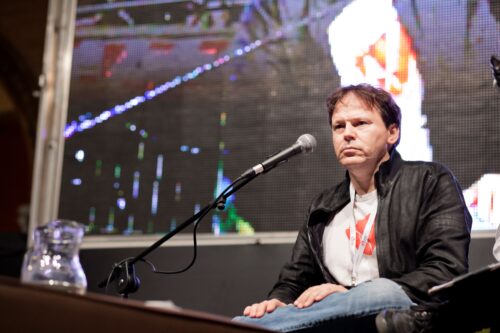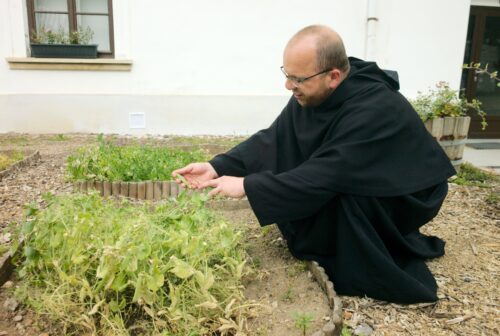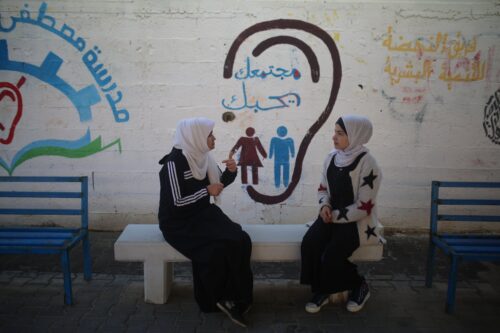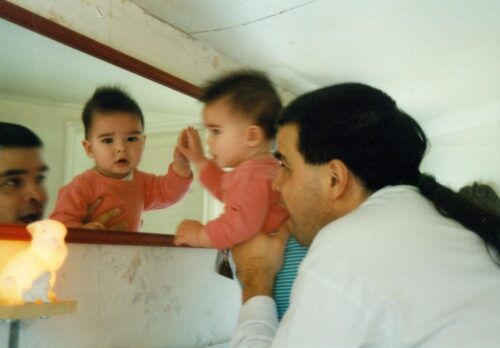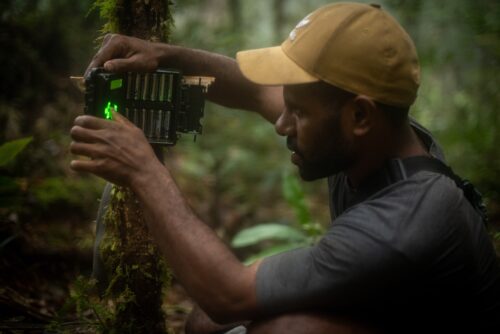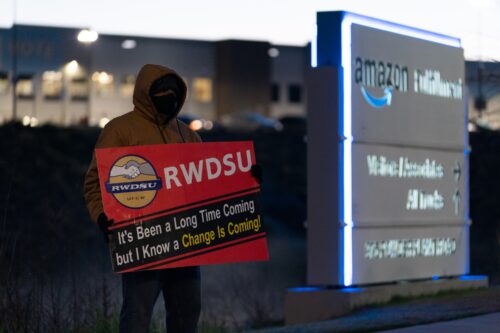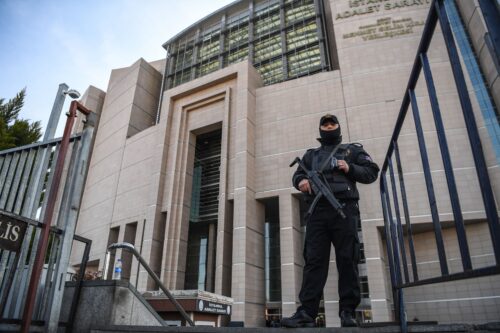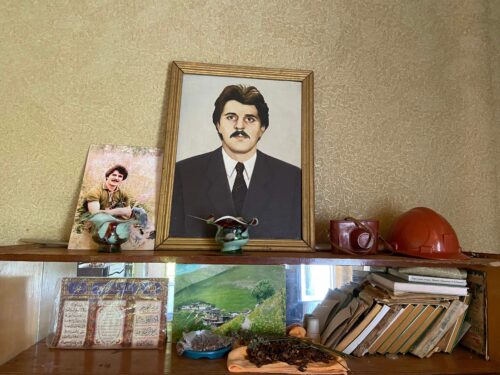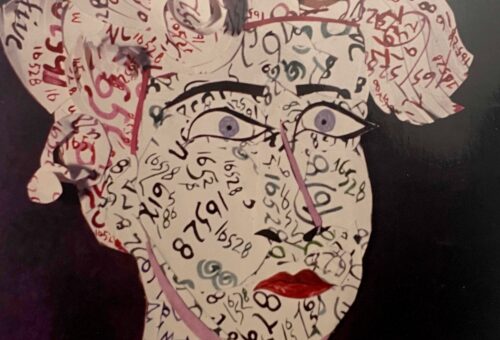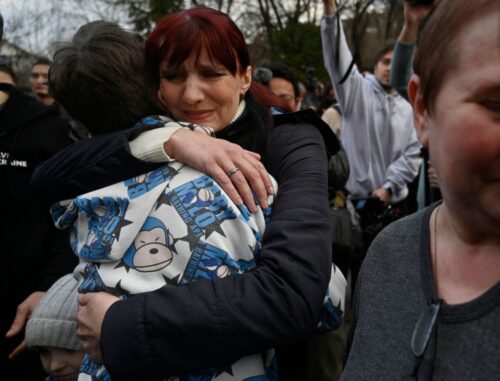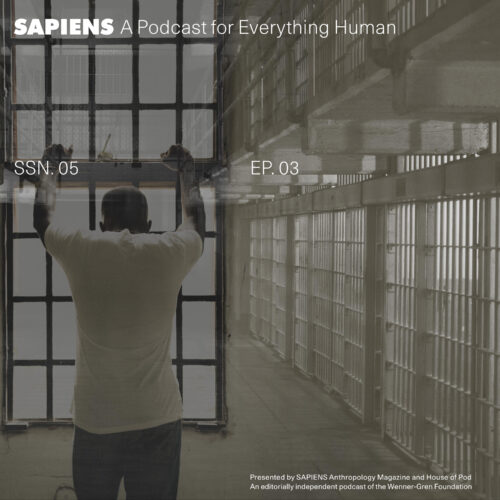Anyone who is in prison has been charged for a crime by a prosecutor. The charges are important because they determine someone’s punishment. How do prosecutors make their charging decisions? And what are the long-term impacts of those decisions?
Reported by Esteban Salmón, an anthropologist born and raised in Mexico City, we learn just how powerful a charging decision can be in the Mexican criminal justice system.
SAPIENS: A Podcast for Everything Human is produced by House of Pod. Cat Jaffee was the editor for this piece, with help from producer Ann Marie Awad. Seth Samuel was the audio editor and sound designer. The executive producers were Cat Jaffee and Chip Colwell.
Esteban Salmón is an anthropologist who studies the ethics of criminal prosecution in Mexico City. He is currently a doctoral candidate in anthropology at Stanford University. His first book explores how immigration enforcement at the U.S.-Mexico border affects the relations between a community of undocumented migrants in New York and their hometown in central Mexico. Before attending graduate school, Esteban worked as a community organizer and policy advocate for access to justice initiatives in Mexico City. His research has been funded by the Fulbright Program, the National Science Foundation, and the Social Science Research Council. Follow him on Twitter @EsteSalmon.
SAPIENS is an editorially independent podcast funded by the Wenner-Gren Foundation. SAPIENS is part of the American Anthropological Association Podcast Library.
Season sponsor:
- This episode is included in Season 5 of the SAPIENS podcast, which is part of the SAPIENS Public Scholars Training Fellowship funded with the support of a three-year grant from the John Templeton Foundation.
The Power of Criminal Prosecutors
Eshe Lewis: Criminal. It’s a label that can follow someone around for their whole life. But how does someone become a criminal? You may think the answer is clear cut, but prosecutors in Mexico who are tasked with charging criminals face enormous challenges, and the choices they make can mean life or death.
What makes us human?
Sara Hoffman: It’s a wild ride. Brace yourself.
Speaker 3: Imagine the future.
Miss Jeri Hutton Green: I will not be quiet.
Koffi Nomedji: You have to start from scratch.
Julio Tiwiram: Una revolución aquí en la mente.
Emily Willis: It gives me goosebumps.
Eshe: What makes us human?
Group: Let’s find out.
Eshe: SAPIENS: A Podcast for Everything Human. My name is Eshe Lewis, and this story comes from producer Esteban Salmón, an anthropologist in Mexico City studying the criminal justice system. All names in this story have been changed to protect the identities of those involved. Some voices have been changed as well. This story also contains some strong language in Spanish.
Esteban Salmón: The night that would forever change David’s life started out like a regular Sunday in eastern Mexico City. David and his friends were drinking and messing around in a bar. One of David’s friends asked a woman to dance.
David (Spanish): No, pues ahora sí que, la verdad, pues.
David (English): No, really. This is the truth.
Esteban: This is David. He’s inside a Mexican prison, and he’s telling me his story over the phone.
David (Spanish): Ya no sé quién la invitó a bailar y ella no quería y pues mi amigo le empezó a decir de cosas.
David (English): I don’t know who asked her to dance, but she didn’t want to. So my friends started saying things to her.
Esteban: The woman wasn’t at the bar alone. She was there with another man.
David (Spanish): Y el problema no fue adentro, ya fue pero cuando salimos.
David (English): The problem wasn’t inside the bar. It was outside.
Esteban: At 2 a.m., the bar closed and everyone went out on the street. That’s when David’s friend picked a fight.
David (Spanish): Y pues uno de mis amigos. O sea que no fue mi problema.
Esteban: David says that it was his friend who picked the fight. Therefore, it shouldn’t have been David’s problem to solve. And yet …
David (Spanish): Pero ya sabes que. Bueno, yo en mi caso nunca me dejaba.
David (English): But you know what? I’m no pushover. I’ve never bailed on my friends. So if I saw a problem, any problem, I was going to help.
Esteban: David joined in the fight.
David (Spanish): Desafortunadamente iba pasando la patrulla y vio la pelea.
David (English): Well, unfortunately, a cop car was buzzing by and saw the fight.
Esteban: The street outside the bar became a crime scene.
David (Spanish): Entonces ellos se acercan y pues las otras personas nos ganan digamosel tanto.
David (English): So as the cops came closer, the other group got to them first. They immediately told the cop, “Hey, these guys are trying to beat us up and rob us.” We said, “No, this is just a fight.” But the cops didn’t listen to us. They believed them because they spoke first.
David (Spanish): Ellos como hablaron primero le tomaron la palabra ellos.
Esteban: The police confiscated his money and phone, and they said it was the evidence of the robbery. He tried to explain to the officer that it wasn’t a robbery, just a regular brawl after a night of drinking. But the police replied, “We’ll do our jobs and you do yours.”
David (Spanish): Pues ahora simplemente, pues dar un consejo. Pues …
David (English): Well, I’d like to just give a word of advice. As you were saying, unfortunately, a fight can become anything, even something more serious than a robbery. It can become a homicide. They can accuse you of anything they want to, and you’re on the losing end.
David (Spanish): Te pueden acusar por. Y tú la llevas de perder.
Esteban: The officer handcuffed David and his friends. Then they drove them to the nearest prosecutor’s office. The first interaction with the prosecution is a crucial moment for detainees like David and his friends because prosecutors have the power to decide how to classify the incident. Was it just a bar fight, or was it something more serious? How should David and his friends be punished? This moment is formally called the charging decision. And it is so important because depending on this decision, people might become suspects or walk away free. They might enter the criminal justice system and get a conviction that will follow them forever.
When I first started studying Mexico’s criminal justice system two years ago, I thought these decisions were made carefully. I thought prosecutors interviewed all the parties involved, evaluated the evidence, deliberated. But I’ve now spent hundreds of hours observing the everyday work of prosecutors, and I realize things are more complicated than this. Prosecutors are overworked, and they confront many different kinds of pressures.
In addition to observing the everyday work of prosecutors, I spent months with people who have been charged and punished by those prosecutors. I spent hundreds of hours interviewing people who had been incarcerated, and they spoke at length with their relatives and their lawyers.
My research focused on a neighborhood with one of the highest rates of incarceration and violent robberies in Mexico City. David comes from this neighborhood.
The cops who picked up David and his friends escorted them to the prosecutor’s office. They walked down a long hallway, subdivided into four lines of small cubicles. This is where the prosecutors sit and wait for the next case. Some of the prosecutors play music on their cellphones. Some talk and joke with each other. Others interview crime victims.
There are no official rules against eye contact. But in this hallway of prosecutors and suspects, the prosecutors don’t look up when the police escort suspects like David and his friends past the cubicles, and the police hold down the heads of the suspects so they are forced to stare at the floor. Suspects are taken to the very last cubicle. This is where the charging decision starts. There, the prosecutor usually begins with a question to one of the officers, like:
Prosecutor (Spanish): ¿A ver, qué me trajiste?
Prosecutor (English): What did you bring me?
Esteban: Then the prosecutor asks the officer to describe the events leading to the arrest. Maybe someone called 911 to report domestic violence. Maybe one of the city’s surveillance cameras detected a violent robbery. After describing what they saw, the officers present whatever evidence they have. Drugs, a weapon, or even an injured victim. After the prosecutor learns the perspective of the police, she usually calls the victims to her cubicle and asks them:
Prosecutor (Spanish): ¿Qué pasó?
Prosecutor (English): What happened?
Esteban: Now it is the victim’s chance to tell their side of the story. The account of the police officers and the victim is usually the same because they agree on it before they see the prosecutor. Finally, the prosecutor usually calls the suspects and asks them:
Prosecutor (Spanish): ¿Por qué te trajeron?
Prosecutor (English): Why did they bring you in?
Esteban: This is usually the tensest moment of the process. The suspects typically offer an alternative version of the facts. Then they become frustrated when prosecutors do not believe them or try to find inconsistencies in their accounts. The suspects might get angry, even yell, but prosecutors are used to this. They can yell louder. At this point, a prosecutor typically makes her charging decision.
Prosecutor (Spanish): Violencia familiar, robo calificado, posesión simple.
Prosecutor (English): Domestic violence. Aggravated assault. Simple possession.
Esteban: This whole process usually lasts less than 10 minutes, but the prosecutor’s decision will affect the suspects for the rest of their lives.
What happens next may involve detectives and forensic experts. Sometimes, there’s a review of surveillance camera footage, witness statements, and police reports. All of it is meant to support the charging decision, and it often leads to prison.
Gabriel (Spanish): Por ejemplo este los disque robos.
Esteban: This is Gabriel. He’s a former Mexico City district attorney.
Gabriel (Spanish): Que no ese wey me robó cuando eran dos personas que habían agarrado putazos en la calle y uno dio lana para que al otro lo detuvieran y lo clavaran y le pusieran que robó.
Gabriel (English): For example, the so-called crimes. When someone says, “That guy just robbed me.” But they were just fighting in the street, and one of them bribed the police to arrest the other guy, plant evidence on him, and book him for robbery.
Esteban: As a district attorney, Gabriel worked to combat police abuses. In order to protect his identity, I’m not using his real voice or name. He’s a reformist prosecutor. When I ask him what his favorite constitutional article was, he answered the 16th, the article that protects the rights of criminal suspects. He remembers a case about a man we’re calling Antonio. Antonio was eating tacos at a stand. Antonio’s girlfriend arrived and hit him across the face with a Bacardi bottle. He panicked and started running away. But then the woman cried out:
Woman (Spanish): Me robó, me robó.
Woman (English): He stole from me. He stole from me.
Gabriel (Spanish): Todos lo siguen. Está toda la gente alrededor y eso estaba grabado.
Gabriel (English): So everyone around chased after him, and that’s recorded.
Esteban: When the police arrived, they arrested Antonio, and they booked him for violent robbery. Gabriel had to decide how to charge Antonio. Instead of accepting the police report as the full story, Gabriel asked for the security camera footage as evidence. The footage revealed that Antonio didn’t rob anyone. So Gabriel decided not to pursue the case.
According to Gabriel, these types of cases are so common because officers have the incentive to aggravate crimes.
Gabriel (Spanish): Ahora, hay muchos incentivos perversos ahí, porque por un lado. O sea. Es igual y les dan lana, ¿no?
Gabriel (English): Now there are a lot of perverse incentives there because the police officers might receive bonus for serious cases, no?
Gabriel (Spanish): Pero por otro lado, también está el incentivo de que no es lo mismo una puesta a disposición por una violencia familiar o por una riña a una por robo con violencia.
Gabriel (English): And there’s also the incentive that it’s not the same to book a more serious crime like domestic violence or violent robbery than something less serious, like disorderly conduct for a fight.
Esteban: These practices are part of a larger desire to control crime statistics. Police officers and their supervisors are evaluated according to a number of reported crimes in their precincts and the number of arrests they make. They want to keep crime rates low and arrests high. A prosecutor’s job is to know the distinction between a real and a fake crime. But this is not always easy. Prosecutors in charge of booking suspects usually work 24-hour shifts, and they might need to investigate up to six cases every day. On top of that, fighting with the police might invite trouble, so it is often much better for prosecutors to side with them.
Gabriel (Spanish): Sí, obviamente lo pagué. O sea, a mí me cambiaron justo porque era muy tensa la relación con la policía.
Gabriel (English): Obviously, I had to pay for it. I mean, they transferred me because a relationship with the police was just too tense because they wanted to book those kinds of arrests.
Gabriel (Spanish): Entonces, fue pararlos poco a poco, al principio fue muy tenso.
Gabriel (English): I had to stop them bit by bit. At first it was very tense. They would arrive and say, “We brought this guy.” I would say, “That arrest is bullshit.”
Gabriel (Spanish): No, no, no, no.
Gabriel (English): No, no, no, no, no. They would be mad. And I was like, “I’m not going to accept it, man.”
Gabriel (Spanish): Y se emputaban. Pero era como de wey, no.
Esteban: At one point, Gabriel realized that the police officers were fabricating crimes, so he rejected the arrest. Eventually, he was transferred to another position because his relationship with the police was just too tense. Even high-ranking prosecutors and district attorneys face political pressures to keep crime statistics down.
So now we have a sense of what it’s like to be on either side of this process. But there is one piece of the puzzle still missing. The defense attorney.
Victor (Spanish): He sacado bastante gente inocente porque sí hay mucha gente que no es culpable en los penales.
Victor (English): I have gotten many innocent people off because there are a lot of them in prison who are not guilty.
Esteban: This is Victor, a private defense attorney who works in the prosecutor’s office.
Victor (Spanish): A veces llegan y los agarran sin ser responsables, ¿no?
Victor (English): Sometimes, they lock them up, even though they are not responsible for the crime.
Esteban: In Mexico, criminal defendants have the right to a lawyer, even if they cannot afford one. But according to Victor, it is much better to have a private lawyer.
Victor (Spanish): Un defensor público por tanta carga de trabajo también lo entiendo. Él no puede salir a hacer actos de investigación.
Victor (English): I also understand public defenders. They have such an enormous workload that they can’t go out and investigate everything.
Esteban: As a private attorney, Victor has more time and resources to visit crime scenes and speak to witnesses or forensic experts. With access to more complete evidence, it is easier to get clients acquitted when they are innocent.
Victor (Spanish): Dicen que los que se encuentran dentro de los penales son los que no tienen dinero.
Victor (English): They say that those inside prisons are the ones without money.
Esteban: According to Victor, most people who end up staying in prison are low income because they can’t afford their private lawyer. That said, many of the prosecutors I met actually disagree with Victor. They told me that in trial, private attorneys are often worse than public defenders because public defenders have so much more experience. They go to trial every day, and they know the system from the inside. Victor is an exception to the rule. He’s a private attorney, yes. But he’s worked with clients for more than 15 years.
Victor (Spanish): Hasta la fecha, la relación que tengo con los vecinos, con los licenciados, con los policías de investigación, con los de la Secretaría de Seguridad y no nada más de aquí.
Victor (English): Even now, the relationship I have with the neighbors, with the prosecutors, with the detectives, with the beat cops—and not just here. I work all over the city, even in the states of Mexico and Morelos, where I have another house. I have always been as straight as a die. I’m absolutely straight.
Victor (Spanish): Uno estar cuidando y vigilando a mi familia, ¿no?
Victor (English): I don’t want to be looking over my shoulder, worried about my family.
Esteban: Although Victor has been at it for years, he still confronts the same dangers that many criminal lawyers in Mexico City face. These may include threats to him or his family from families of suspects looking for freedom for their loved ones, or even revenge for those sent to prison. According to Victor, this is why it is important to be straightforward and avoid misunderstandings from the beginning. I spoke with Victor to understand what defense attorneys can do to influence the charging decision of prosecutors. I asked him what he would have done if he had been David’s attorney. Remember, David was a man arrested for fighting outside the bar.
Victor told me that he actually remembered a very similar case, where one of his clients picked a fight outside a bar and was arrested after his opponent accused him of robbery. And in that case, Victor was able to review footage from security cameras.
Victor (Spanish): En ese, en esa situación. Tú nada más, nada más ves en el video que sí hubo una riña.
Victor (English): In that situation, you can see on the video that there was a fight.
Esteban: Victor also asked the waiters to be witnesses in the trial. This made it clear that the police accusations were false. Victor’s clients were acquitted.
In the case of David and his friends, there is something else Victor would do if hired. It’s an informal strategy known as mandar suavecito. This literally translates as “going easy on someone” or, more precisely, “to be more lenient.”
Victor (Spanish): Por ejemplo, en donde …
Victor (English): For example, where there is a robbery or a battery, I can ask the prosecutors to go soft on them. We’ll book them but go soft on them.
Victor (Spanish): No. No le, no le cuadran un cuchillo o un instrumento para agredir, no le cuadran este una pistola, arma de fuego.
Victor (English): Well, meaning they don’t plant a knife or a weapon. They don’t plant a gun or a firearm.
Esteban: Gabriel, the former district attorney of Mexico City, says another example of mandar suavecito could be when a private defender negotiates with a prosecutor to commit intentional mistakes in their investigations. So the case will not hold up during trial.
Victor (Spanish): A veces hay una uestión, no lo tienes muy claro al principio.
Victor (English): Sometimes, there’s an important issue. In the beginning, it’s not very clear. For example, the police arrive, and they want to book someone for domestic violence. A man hit his wife, but as the investigation advances, you realize, “Oh shit, it wasn’t domestic violence but attempted femicide.” So you charge them with attempted femicide.
Esteban: And Gabriel is quick to say that the charging decision is a complex one. A crime is not always easy to classify at first, and charges may change throughout the case because the information changes. It’s not always due to corruption.
Victor (Spanish): Es que mira, no es tan sencillo. Hay gente que dice ay wey pues es bien fácil, no es tan sencillo.
Victor (English): Charging people is not as simple as you might think. There are people who say, “Come on, man, it’s super easy.” But it’s not that simple.
Esteban: According to Gabriel, in the worst days, some prosecutors had to pursue up to six or seven cases, often involving different degrees of violence. This means that the fate of many crime suspects is in the hands of some very tired lawyers.
Let’s return to the case of David and his friends.
David (Spanish): No nos quisieron tomar la palabra, le hicieron más caso a ellos.
David (English): They didn’t want to take us at our word. They paid more attention to the other people.
David (Spanish): No nos quisieron hacer caso.
David (English): They didn’t want to listen to us.
Esteban: After the fight and arrest, David and his friends arrived at 3 a.m. to the prosecutor’s office. At that point, the prosecutor booking them had been working for 18 hours straight. She interviewed the police and the alleged victims but did not interview David and his friends because they were drunk. They were charged with aggravated robbery and sentenced to four years, 10 months, and 26 days. As of the recording of this episode in January 2023, David has served three years and seven months of that sentence.
David (Spanish): Yo tengo que hacer de mi vida normal. Porque pues ahora sí que. Es como una pesadilla. ¿No?
David (English): I have to find a way to make my life feel normal again because now it’s like a nightmare, you know? In the morning, you open your eyes, and you would like to see your bedroom. But the reality is that, no, you’re still here in prison, and it’s like a never-ending nightmare. Do you understand me?
David (Spanish): Como una pesadilla que uno no termina. ¿Me entiendes?
Esteban: The good thing, he says, is that he will be out by next year.
David (Spanish): Por eso que tengo que tener la mente ocupada.
David (English): That’s why I have to keep my mind busy because, otherwise, it’s like you might fall into depression.
Esteban: To help him pass the time, David has enrolled in a carpentry workshop. He makes napkin rings in the form of chickens and toys for children. He earns some money for the expenses of living in prison. But he has also changed in ways he’s not comfortable with.
David (Spanish): Y mi madre me lo ha dicho. ¿No? Eh. Sí me hecho persona dura de carácter que tal vez allá afuera yo no lo tenía.
David (English): My mother told me that I’ve toughened up and I wasn’t like this before, but I didn’t want it to be this way. I needed to adapt—not to get used to this life, but you need to adapt to life in here.
David (Spanish): Y este de lo contrario. Pues como te repito.
David (English): Otherwise, as I was telling you, people will see you differently and might get it wrong. They will think you’re a fool or weak.
David (Spanish): Y que es lo que menos quires tu.
David (English): That’s the one thing you want to avoid in here.
Esteban: David is both worried about how he has changed in the present and what his life will look like in the future. After he gets out, David is worried about having a criminal record. He knows that with a record, you need to be more careful about not getting into any kind of trouble, not even a fight. He also knows that it will be hard for him to find a job.
David was out drinking. He got into a fight. He was accused of robbery and sentenced to prison. If you ask me, he was prosecuted because police officers have incentives to aggravate crimes. And the prosecutors are under similar pressure to charge people for the most serious convictions.
This is part of the situation that fuels incarceration in Mexico City. This is not the fault of individual prosecutors. They’re actually following the will of voters. In Mexico City, when high-profile crimes such as forced disappearances and femicides go unpunished, there is a popular outcry in the streets, the press, and social media.
Speaker 8: De última hora en la Ciudad de México familiares de personas desaparecidas realizan una protesta.
Speaker 9: ¡Carpeta archivada, no sirve de nada!
Speaker 10: Por ello las mujeres hoy en apoyo de Victoria y de su padre se manifestaron afuera de la Fiscalía de la Ciudad de México logrando que la autoridad se comprometiera en dar seguimiento al caso.
Speaker 11: ¡Justicia para Victoria! ¡Justicia!
Esteban: It’s in this political landscape that politicians and prosecutors shape their agendas. Many democracies around the world are confronting these popular demands for punishment. In Latin America, more than 80 percent of voters said they approve of harsher penalties for crimes. That’s according to a 2017 survey by Vanderbilt University.
In Mexico City in particular, many voters are concerned about a so-called impunity crisis. They think that the majority of crimes go unpunished. According to a progressive think tank, Mexico Evalúa, 98 percent of crimes go without conviction.
Claudia Sheinbaum, the mayor of Mexico City, has made the fight against impunity a central part of her security agenda.
Speaker 12 (Spanish): Este sábado la jefa de gobierno, señaló que ahorita no.
Speaker 12 (English): On Saturday, Mexico City’s mayor said that there would not be corruption or impunity in the intervention of Mexico City’s prosecutor’s office.
Speaker 13 (Spanish): Es un tema de la procuración de justicia.
Speaker 13 (English): This is about criminal prosecution. As long as there is impunity, we will not have security.
Speaker 14 (Spanish): Como bien dice la procuradora ni se fabrican culpables.
Speaker 14 (English): As the state attorney said, “We will not fabricate culprits, but we will not let them go unpunished either.”
Esteban: While crime rates may still be high, Sheinbaum has surged in popularity because the kinds of crimes reported have decreased—things like robberies, kidnappings, and extortion. She’s one of the strongest contenders to become Mexico’s next president. She has given the police unprecedented powers. Nevertheless, she has not improved the conditions of the prosecutor’s office, which is responsible for keeping a check on police misconduct. As a result, police jurisdiction has increased during her tenure.
David (Spanish): Desafortunadamente, si la policía no nos hizo caso, pues menos ellos.
David (English): Unfortunately, if the police don’t listen to us, the prosecutors won’t listen either.
Esteban: Here’s David again.
David (Spanish): Tú ya estando ahí, desgraciadamente ya estás, como se dice vulgarmente, este tú ya estás dado, ¿no? O sea, ya no tienes como …
David (English): Once you’re arrested, you have to surrender. There’s no real way to protect yourself, you know?
Esteban: This is the whole point of my research. The public thinks that most crimes go unpunished. So the police are given more power. As the police have more power, more cases like David’s arrive in the prosecutor’s office. The prosecutors become even more overworked. Defendants like David feel as though they have fewer and fewer rights, and the criminal justice system becomes more and more broken.
If I had to offer a solution, it would be to respect the autonomy of prosecutors. Their supervisors should allow them to use alternatives to prison. Some examples could be probation, mediation, and the complete dismissal of lesser crimes, such as shoplifting or simple possession. This autonomy will also allow them to reject arrest with little grounds or that seem fabricated. Until prosecutors have more autonomy to pursue alternatives to prison and reject arrest, they will continue to evade popular pressures for harsher and harsher penalties, and the whole system will work to punish innocent people like David.
Eshe: This episode was produced by Esteban Salmón. Esteban is currently a Ph.D. candidate at Stanford University, studying the ethics of criminal prosecution in Mexico City. You can learn more about him in the show notes. Emilio Carrera provided the voice of Gabriel. Olivia Aguilar provided the voice of the female prosecutor in Spanish. Sabrina Aparicio and Cat Jaffee contributed the recording of other voices. Diego Lecanda provided the English voice of David. Rodrigo Santacruz provided the English voice of Gabriel. Nicolás Colombo provided the English voice of Victor. David Gomez lent us some of his recording equipment. Ana Laura Magaloni, Angela Garcia, and Thomas Blom Hansen inspired many of the ideas discussed in this episode. Esteban wants to thank all of them for their generous support.
SAPIENS is produced by House of Pod. Ann Marie Awad and Cat Jaffe were the editors of this piece. Seth Samuel is our audio editor and sound designer. Our executive producers are Cat Jaffe and Chip Colwell.
This episode is included in Season 5 of the SAPIENS podcast, which is the end product of the SAPIENS Public Scholars Training Fellowship, funded by the John Templeton Foundation. SAPIENS is an editorially independent podcast funded by the Wenner-Gren Foundation, which has provided vital support. Our thanks to Danilyn Rutherford, Christine Weeber, Maugha Kenny, and their staff, board, and advisory council.
SAPIENS is part of the American Anthropological Association Podcast Library. For more information, visit SAPIENS.org and check out the additional resources we offer in the show notes, on our website, or wherever you’re listening to this podcast. I’m Eshe Lewis. ¡Hasta luego!



